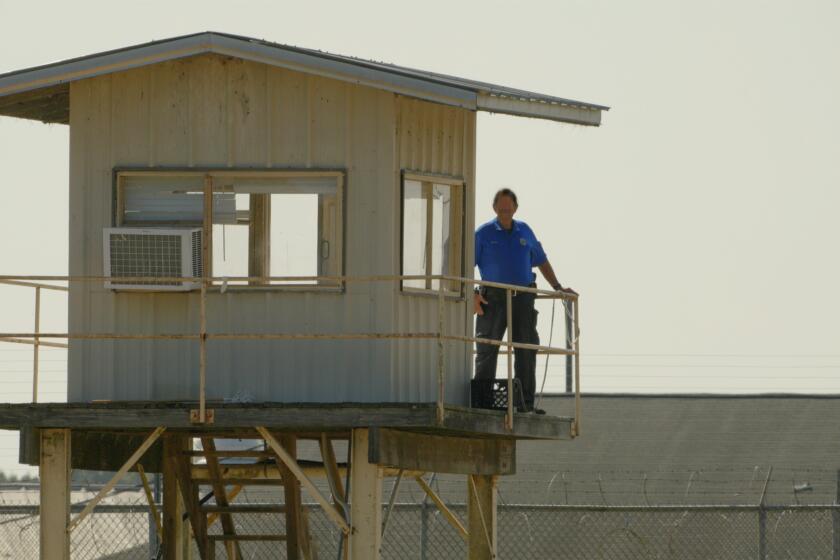NYFF 2013: With voice-centric ‘Her,’ Spike Jonze makes a statement
- Share via
NEW YORK — Over a two-decade directing career, Spike Jonze has often been about the big hook, visually and conceptually. In his videos and films, he’s offered up plenty of ideas, and made them look sharp to boot. But could he square all that with a gently told romance?
That’s the question posed by “Her,” Jonze’s future-set, Joaquin Phoenix-starring story of love and technology — and answered with a resounding yes. The new movie lands on multiple levels and, not surprisingly, received a rapturous response Saturday night at the New York Film Festival, where it made its world premiere.
The basics: Living in the not-terribly-distant future — video games and email are a lot more sophisticated, but they’re still video games and email — is Phoenix’s Theodore Twombly. Lonely after separating from his wife (Rooney Mara), he decides to download a new “operating system,” essentially an AI program-slash-companion named Samantha that, as it tells him via its human voice (Scarlett Johansson, replacing the previously cast Samantha Morton), has the power to evolve.
VIDEO: NYFF 2013 movie trailers
The movie then follows their relationship, platonic at first and soon romantic (among its many distinctions, “Her” may contain the most unconventional on-screen sex scene in recent memory). Early fan discussions have wondered how much we as an audience are supposed to believe that Twombly could really fall in love, but any comparisons to “Lars and the Real Girl” or other man-unhinged conceits quickly dissipate; unlike Ryan Gosling’s affection for the inanimate, this is a substantive and two-directional relationship. It’s also not scorned at by (most) other characters, which has the effect of rooting our sympathies squarely with Twombly.
If there’s an exotic specificity to the “Her” setting, there’s a universality to its story, particularly its exploration of love and loss. “The great thing about this film [is that] everybody finds a piece of their issues in it,” Amy Adams, who co-stars as Twombly’s friend and neighbor, told reporters earlier in the day.
Beyond questions of relationships and loneliness, “Her,” which Warner Bros. brings to theaters Dec. 25, also has plenty to say about the future. As Jonze imagines it, in the decades ahead we’ll have solved problems of population density by building upward — light-filled high-rises are where most people seem to live and work, even in the film’s Los Angeles setting — and threats such as global warming and terrorism, improbably, have not seemed to hurt us. Perhaps even more outlandishly, L.A. has a useful and popular public-transit system.
PHOTOS: Fall movie sneaks 2013
Technology has largely been marshaled to our advantage, too, though that appears to be changing with the events of the sort documented here. Jonze has made a movie about a society just on the cusp of conscious machines, a nifty move that allows the film, and in turn us, to contemplate such a development’s many consequences.
In movies like “Adaptation” and “Being John Malkovich,” Jonze went madcap and meta in the third act, something that could derail a more delicate human story. At the same time, crafting too grounded a story could undermine what makes it a Jonze pic in the first place. Yet Jonze, who directed “Her” from his own screenplay, manages to do both here, the emo and the wild whimsy all kept in nice balance. (It’s worth noting that, though distributed by Warner Bros., the movie was financed by the auteur-friendly Megan Ellison, who in the past few years has allowed creatively stubborn filmmakers like Paul Thomas Anderson and Kathryn Bigelow to make their movies with a minimum of interference.)
The movie also benefits from Phoenix’s ability to act and react with no physical co-star (though Morton was on set, the Samantha character never appears on screen). At the gathering with reporters, Phoenix, terse as always, did offer a forthcoming thought, or at least a quip, on that experience. “I’d like to say I trained really hard, but as an actor I’m used to walking around the house talking to myself,” he said.
Though the film’s premise evokes comparisons to Siri, Jonze said he actually had the idea well before the Apple digital assistant came along, after using a program called Alicebot about ten years ago. As geek nostalgists will recall, that intriguing if at times crude software (it flunked the industry-standard Turing Test) would attempt to engage users in everyday chatter based on a database of prior conversations. Jonze liked it, and decided to apply a film genre to it. “I thought about that idea, and what if you had a real relationship with it?” Jonze told reporters. “And I used that as a way to write a relationship movie and a love story.”
He also had in mind a neat trick: pairing the vision of a glossy future with the darkness of one man’s depression. “It’s a world you should be getting anything you need,” he said. “What I’m doing is making this utopian future and asking [what it means] to feel lonely in that setting.
Four years ago, Jonze had some fans frustrated with “Where the Wild Things Are,” a movie which of course worked off someone else’s originality and may have lost something in translation. With a new piece that’s an original in more ways than one, he looks poised to win many of those fans back, and make some new ones in the process.
ALSO:
NYFF 2013: ‘Nebraska’ begins to shed its husk
NYFF: Does ’12 Years A Slave’ deserve hard-to-watch label?
NYFF: Ben Stiller’s ‘Secret Life of Walter Mitty’ realizes a fantasyFollow me on Twitter at https://twitter.com/ZeitchikLAT
More to Read
Only good movies
Get the Indie Focus newsletter, Mark Olsen's weekly guide to the world of cinema.
You may occasionally receive promotional content from the Los Angeles Times.










